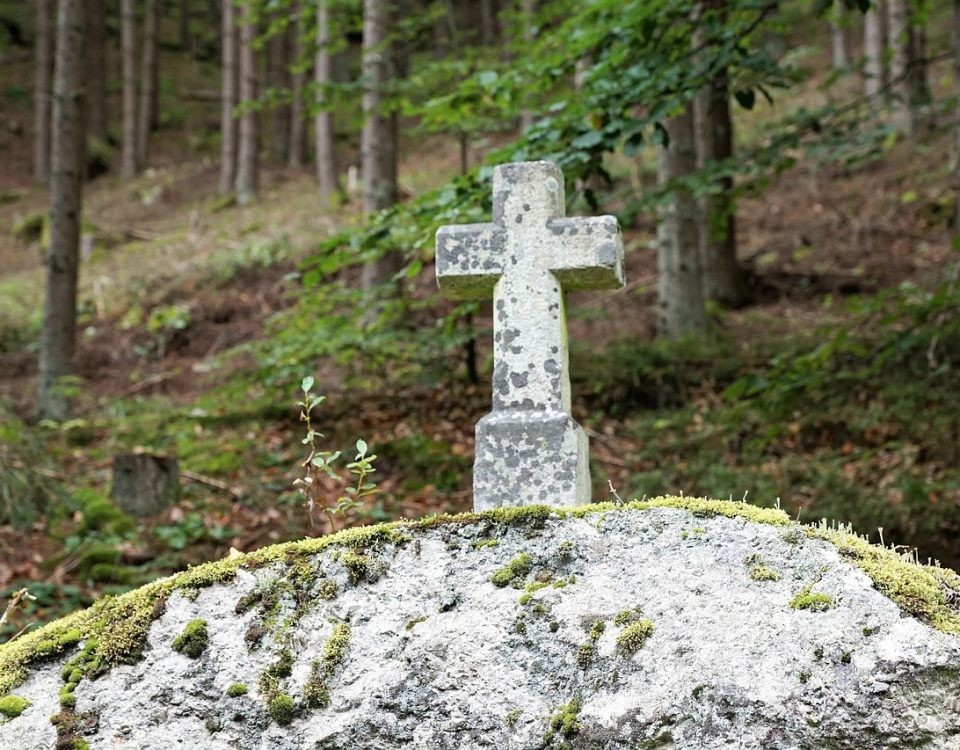Two days after Hitler became chancellor of Germany, 1 February 1933, a young theologian and college chaplain (not yet 27), named Dietrich Bonhoeffer, gave an address on the radio entitled, “The Younger Generation’s Changed View of the Concept of the Führer.”
In it he criticized what was at the time the newly ascendant concept of political leadership, the concept enshrined in the very word “Führer.” Bonhoeffer warned of the danger of idolatry inherent in it. The danger he said was that a political leader may confuse the loyalty due to his office or the loyalty due to the state with the loyalty he thinks due instead to himself as a person—thus becoming a “misleader,” a “seducer,” an “idol.” “He must radically deny himself the temptation of becoming the false god,” he said—again, two days after Hitler became chancellor of Germany. It was, many think, the first public criticism of Hitler. Bonhoeffer’s microphone was mysteriously switched off before he could finish his address.[1] This young teacher, a chaplain of some insignificant small college, was the first to speak out against a political evil which everyone recognizes now but which only few did then—when it mattered, before millions had to die.
Now I bring this up simply as an instance and as an example of what belongs to the Christian tradition, the preacher’s tradition and the prophet’s too. And that is what I will call this morning the ministry of warning; it’s the burden that is sometimes placed upon ministers of the Gospel to speak the uncomfortable and unpopular truth when no one wants to hear it, the burden even sometimes to name the enemies of truth, to name the names of evil present in our day. This is properly part of the tradition. It belongs to the office of the preacher, and any preacher who doesn’t accept this burden is unworthy and a coward. Whether you like it or not—if I am actually a preacher the Gospel and not just some purveyor of forgettable platitudes—I must be willing to warn you even when you think you don’t need warning. Because I am a shepherd, and this is a world of wolves.
So, Paul, with tears in his eyes: he warned the Philippians about the “enemies of the cross of Christ.”[2] So too Jesus: he repeatedly warned his followers to beware of the “yeast” of the Pharisees and Sadducees.[3] Readily and repeatedly Jesus warned the disciples about “false prophets” and “wolves.”[4] He even warned his disciples about themselves. In Capernaum, after teaching about the bread of life, Jesus turned to the Twelve and said, “[O]ne of you is a devil.”[5] It’s part of the tradition, this ministry of warning. To the newly baptized Augustine used to remind them that the Church was a “mixed” community. “[S]tick to the good ones,” he said. “Don’t go mingling with bad behavior and morals…of bad Christians,” he told them.[6] Preachers can do this—preachers worthy of the pulpit, that is. It’s not something we’re accustomed to in our day of course, but maybe that’s why our Christianity frankly is so weird and vapid, impotent and unappealing and adolescent.
Be “imitators of me,” Paul said, and look to the glorified body of Jesus Christ and avoid the enemies of Christ.[7] What Paul is doing here is what every good parent does for his or her children—teaching, modeling, directing, nudging, and sometimes even commanding. Iris Murdoch said once that the moral training of children begins when parents guide them through the pictures, music, stories, and verses of our natural and artistic world and simply says, “Look, listen, isn’t that pretty, isn’t that nice?”[8] Children are impressionable. If as parents we’re not clueless, we know this. One study suggests children begin to develop “brand consciousness” at about 24-months.[9] Advertisers know this very well seems sometimes. Children are meant to be taught and are always at all times learning, but what are they learning? This is why I risk saying something on the surface perhaps insulting, that parents who don’t guard their children’s media consumption are by definition bad parents.
But what’s true for children is true for adults too. The philosopher, Alasdair MacIntyre, argued rather plainly that for a person to be truly independent, rather than simply infantile, that person had to acknowledge his or her dependence upon others. “My physician, or my trainer, if I am an athlete, or my teacher, if I am a student, may well be better placed to make judgements about my good than I am,” he said.[10] Acknowledging and accepting the wisdom and even the authority of others is simply part of being an adult, part of being fully human. It was a soldier Jesus praised as a man of great faith—why? Because he said, “I too am…subject to authority,” recognizing the authority of Jesus and his power.[11] It’s part of human flourishing, and to be without it—to quote Simone Weil—is to be quite ill.[12]
And so, if this is true—true that to be fully human one must accept the authority and wisdom and even sometimes the firm warning of others—what does that say about those versions of Christianity and those preachers who feel they can no longer speak with authority or warn their flocks like the prophets of old? What does it say about you as an individual Christian when you assume the Church has no real authority over you, when you’ve never really taken seriously the Church’s call to obedience in this or that or any matter? What does that say about your Christianity? Is it Christianity? Or is it something else altogether? Once we preachers were bold but not so much anymore. Why is that? Yes, the Church has a big credibility problem, but that’s not the only problem. There’s more to it than that, I think.
Today we heard the story of the transfiguration of Jesus. Dazzling and white as snow on the mountain, he prefigured the glory preserved only for the saints of God, the followers of Jesus and bearers of the cross. Today we heard the story of the beauty of God, a beauty meant to inspire and entice, a beauty meant to draw you toward the holiness of that divine glory. But between us and that beauty is a world of darkness and wolves and danger and crosses. And Jesus said the path is narrow and difficult, a path of sacrifice and even death.[13] But he gave us apostles and prophets, preachers and priests, martyrs, and men and women with the courage of truth. And they are meant to point to that divine glory, that transfigured glory; but they are also charged with pointing out evil, pointing out dangers to both body and soul. “You…I have appointed watchman,” God said to Ezekiel.[14] That is part of the faith; there is no such thing as Christianity without it, without the prophet willing to tell you that have you sinned and that you risk even the very death of your soul. There is no such thing as Christianity without it, without the ministry of warning.
And so, my point today is simply this: If you want that glory, that beautiful, transfigured glory of God and heaven, well then you need to be the sort of mature Christian that can handle and accept the full counsel of God. You need to accept the sort of Christianity in which you understand the goodness of truth and the virtue of obedience and also the unpopularity of faithfulness. Otherwise, in the long run, it would have been better if you had not seen that beauty all. I do want to preach the gospel to you—but all of it. I do. Because he was beautiful on that mountain, you know—very beautiful.
[1] Behind Valkyrie, ed. Peter Hoffman, 13-19
[2] Philippians 3:18
[3] Matthew 16:6 passim
[4] Matthew 7:15 passim
[5] John 6:70 (English Standard Version)
[6] Augustine, Sermon 260C 7; 260D 2
[7] Philippians 3:17-21
[8] Iris Murdoch, Metaphysics as a Guide to Morals, 3
[9] Peggy Orenstein, Cinderella Ate My Daughter, 206
[10] Alasdair MacIntyre, Dependent Rational Animals, 71
[11] Matthew 8:9
[12] Simone Weil, The Need for Roots, 14
[13] Matthew 7:14 passim
[14] Ezekiel 33:7
© 2022 Rev. Joshua J. Whitfield










